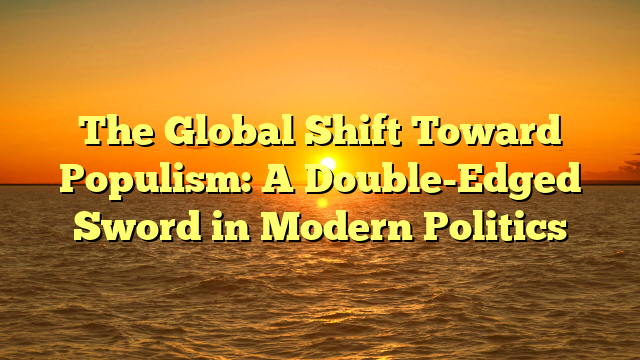In recent years, a significant shift has been observed in the political landscapes of both developed and developing nations: the rise of populism. From Europe to the Americas, Asia to Africa, populist leaders and movements have gained ground, challenging traditional political establishments and promising to return power to “the people.” While this surge has energized large portions of the electorate and addressed longstanding grievances, it has also introduced risks to democratic institutions, social cohesion, and international relations.
Populism, at its core, is a political approach that seeks to appeal directly to ordinary people who feel their concerns are disregarded by established elites. Leaders who embrace populism often position themselves as outsiders, fighting against a corrupt or disconnected ruling class. This rhetoric resonates with voters who have experienced economic inequality, job insecurity, or cultural shifts that make them feel left behind.
A major catalyst for the populist wave has been economic disparity. The 2008 financial crisis eroded trust in institutions and exacerbated income gaps across the globe. In many democracies, particularly in the West, the middle class shrank, and wealth became increasingly concentrated among the top few percent. This environment proved fertile ground for populist leaders who promised sweeping change and cast blame on globalism, immigration, or entrenched political elites.
Social media has also played a pivotal role in the rise of populism. Platforms like Twitter, Facebook, and YouTube have allowed populist figures to bypass traditional media gatekeepers and connect directly with voters. This unfiltered communication has been a double-edged sword: while it has enabled greater political engagement, it has also contributed to the spread of misinformation and increased polarization.
Populism is not inherently left or right-wing. Left-wing populists, such as those in Latin America (e.g., Venezuela under Hugo Chávez), focus on wealth redistribution and social justice. Right-wing populists, seen in countries like Hungary, Brazil, or the United States under Donald Trump, often emphasize nationalism, anti-immigration policies, and cultural identity. Despite their differences, both forms can weaken democratic norms by concentrating power in the hands of charismatic leaders and undermining institutional checks and balances.
Critics argue that populism often simplifies complex issues, offering easy solutions to deeply rooted problems. For instance, blaming economic woes solely on immigration or foreign competition ignores broader structural factors like automation, education gaps, or domestic policy failures. Moreover, when populist leaders face opposition, they may delegitimize the judiciary, media, or electoral bodies—threatening democratic resilience.
However, it would be a mistake to dismiss populism entirely as a destructive force. In ketua123 , it has highlighted real failures of governance and brought underrepresented voices to the forefront. Populist movements have drawn attention to the limitations of globalization, the need for more equitable economic policies, and the alienation felt by rural or working-class communities.
The challenge for modern democracies is to respond to the concerns that fuel populism without undermining democratic principles. This requires restoring trust in institutions, ensuring political transparency, and fostering inclusive economic growth. Political parties must also evolve to reflect changing social dynamics and listen more attentively to their constituents.
In conclusion, populism is reshaping politics in profound ways. While it offers opportunities to correct systemic flaws and revitalize political engagement, it also poses significant threats if left unchecked. The future of global democracy may depend on how effectively societies balance populist energy with institutional integrity and long-term vision.
